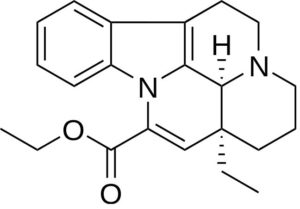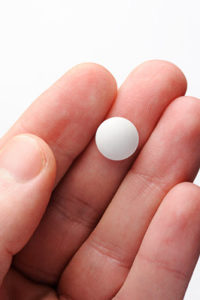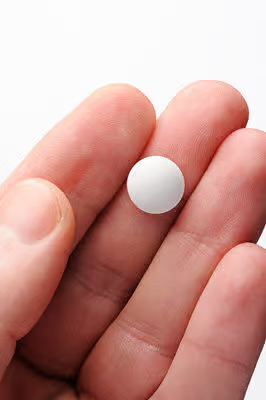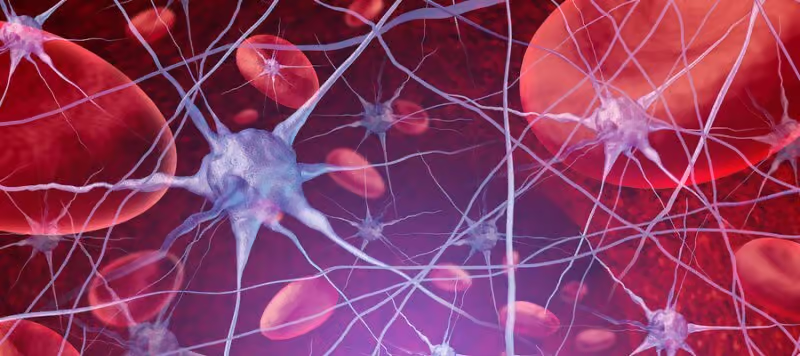Table of Contents
Vinpocetine (periwinkle extract, ethyl apovincaminate, Cavinton, Bravinton, Ceractin, Intelectol) is a semi-synthetic derivative of vincamine, an alkaloid derived from the lesser periwinkle plant (Vinca Minor L.).

Vinpocetine was first isolated from the periwinkle plant in 1975 by chemist Csaba Szántay. Hungarian pharmaceutical company Gedeon Richter began manufacturing Vinpocetine in 1978. Vinpocetine continues to be one of the company’s top selling drugs world-wide.[i]
Vinpocetine is used as a prescription drug in Japan, Europe, Mexico and Russia for the treatment of cognitive and cerebrovascular disorders. In the USA and Canada, Vinpocetine is sold as an OTC dietary supplement.
As a nootropic, Vinpocetine is used primarily to increase cerebral blood flow.
Other uses include using Vinpocetine for the prevention of motion sickness, menopause symptoms, chronic fatigue syndrome, seizure disorders, hearing and eye disorders, and even as a topical application to increase female sexual response.[ii]
Here we’ll investigate Vinpocetine’s value as a nootropic and to optimize cognition.
Vinpocetine helps:
- Cerebral Circulation. Vinpocetine helps boost blood flow to and within the brain. Improving the flow of oxygen and glucose that feed ATP to power brain cells. Improving alertness, cognition, concentration, memory and mood.
- Neuroprotectant. Vinpocetine blocks the accumulation of sodium in neurons, reduces the toxic effects of oxidative stress, inhibits the enzyme PDE1 and boosting blood flow, scavenges free radicals, and protects neurons from glutamate and NMDA toxicity.
- Neuroplasticity. Vinpocetine inhibits the enzyme PDE1 which can increase cAMP and cGMP. These cyclic nucleotides in turn activate a series of kinases that phosphorylate the transcription factors cAMP response element binding protein (CREB) and serum response factor (SRF), leading to the expression of plasticity-related genes.[iii] Boosting neuroplasticity enhances cognition and memory.
Overview
Vinpocetine (Cavinton, Intelectol) is a unique nootropic supplement derived from the lesser periwinkle plant (Vinca Minor).
A flowering plant native to central and southern Europe and Turkey, Vinca Minor is also grown as ground cover in the United States.

Since it was first released in 1978, Vinpocetine has earned a well-deserved reputation with the nootropics community for optimizing cognitive health. Primarily by boosting cerebral blood flow.
But to understand how and why Vinpocetine boosts cognition and protects your brain, we need to dive in to how blood flows in your brain.
An optimized adult brain gets about 1/7th of your heart’s output of blood every minute. Your brain needs this blood flow for a constant supply of glucose, oxygen and other nutrients to keep it functioning properly.
Unlike other organs and muscles in your body, your brain cannot stand an interruption in this steady flow of blood.
Two carotid arteries in the sides of your neck send blood to the front and top of your brain. Arteries in your vertebrae (spine) join with your carotid arteries at the base of your brain to form the Circle of Willis.[iv]
The Circle of Willis is critical because it is the only area of your body where all four major blood vessels join. Allowing blood to be sent to areas where it is needed. Even if one of the major blood vessels becomes blocked.
We’ll take a look at “How things go bad” later in this article. The good news is that Vinpocetine can have a profound effect on maintaining and repairing your brain’s blood vessels, cerebral blood flowing through the Circle of Willis, and to individual brain cells.
Vinpocetine not only helps increase cerebral blood flow, it also works as a powerful antioxidant and anti-inflammatory in your brain.
How does Vinpocetine work in the Brain?
Vinpocetine boosts brain health and function in several ways. But two in particular stand out.
- Vinpocetine boosts cerebral circulation. Your brain only accounts for about 2% of your bodyweight, but it consumes about 20% of the oxygen and nutrients circulating in your blood.[v] This is why strong, healthy cerebral blood flow is so critical to your brain health and cognitive performance.
Vinpocetine inhibits an enzyme called PDE1 (phosphodiesterase type 1) while reducing calcium levels in brain cells. When both of these are elevated, the smooth muscle in blood vessels contract, narrowing the diameter of blood vessels. And restricting blood flow to that area of the brain.
You may be familiar with PDE5 inhibitors like Viagra® which work to dilate blood vessels and maintain healthy blood flow to your penis. Vinpocetine has a similar mechanism of action in your brain.
In two separate clinical studies, chronic ischemic post-stroke patients were treated with either a single infusion, or daily infusion of Vinpocetine for 2 weeks.
Vinpocetine increased cerebral glucose uptake and glucose metabolism in both the stroke region of the patient’s brains as well as the intact brain tissue.
Patients in the 2-week long treatment also showed increased cerebral blood flow especially in the thalamus, basal ganglia and visual cortex regions of the brain.[vi]
- Vinpocetine is an anti-inflammatory. Vinpocetine prevents the upregulation of NFκB (nuclear factor kappa-light-chain-enhancer of activated B cells) by TNFα (tumor necrosis factor alpha).
This sounds a little complicated, but has serious implications in the development of Parkinson’s and Alzheimer’s Disease. Here’s how it works…
NFκB is a protein complex that controls transcription of DNA, cytokine production (signaling protein) and cell survival. TNFα is a signaling protein (cytokine) involved in inflammation produced by neurons. Vinpocetine inhibits this action.
Vinpocetine also reduces the TNFα-induced expression of the mRNA of pro-inflammatory molecules such as interleukin-1β, monocyte chemoattractant protein-1 (MCP-1), and vascular cell adhesion molecule-1 (VCAM-1).
Researchers have found that Vinpocetine prevents this inflammatory response at the cellular nucleus level. And this mechanism of action is independent of Vinpocetine’s action on PDE1.
This is a very big deal because TNFα contributes to the neuronal cell death found in Parkinson’s Disease. And there is growing evidence that the accumulation of amyloid-β protein leads to an upregulation of interleukins and TNFα that contributes to neurodegeneration leading to Alzheimer’s Disease.
Scientists are now working on trying to determine if Vinpocetine can reduce inflammation in the brain. And help protect the brain from developing Parkinson’s or Alzheimer’s.[vii]
How things go bad
Poor cerebral blood flow, inflammation and free radicals (oxidation) can damage your brain. And one of the ways this manifests is memory loss. Left unchecked, it can develop into serious neurodegenerative diseases like Alzheimer’s and Parkinson’s Disease.
↓ Cognitive function declines
↓ Inflammation kills brain cells from the inside
↓ Free radicals destroy neurons and synapses
↑ Anxiety, depression and moodiness increase
↓ Concentration and memory declines
Poor cerebral circulation causes a domino effect in the brain affecting many critical processes. Memory, cognition, and decision-making all suffer as a result.
Vinpocetine benefits
Vinpocetine is one of the most researched nootropics on the planet. It was introduced to clinical practice in Hungary in 1978 for the treatment of cerebrovascular (brain blood flow) disorders and related symptoms.
Since then Vinpocetine has become a “reference compound” in pharmacological research of cognitive deficits caused by hypoxia (oxygen deficiency), ischemia (inadequate blood supply) and research into cyclic nucleotides (cAMP and cGMP).
Vinpocetine’s mechanism of action in the brain includes:
- Increasing brain blood circulation and oxygen utilization
- Increased tolerance for hypoxia and ischemia
- Anticonvulsant activity
- Inhibiting the PDE1 enzyme
- Increasing the pliability of red blood cells
- Inhibiting the aggregation of platelets (blood clots)[viii]
Hundreds of studies in animals and humans have shown Vinpocetine can repair and reverse the effects of damage caused by strokes. Vinpocetine can prevent the inflammation and damage by free radicals that can lead to neurodegenerative diseases like Parkinson’s and Alzheimer’s.
Vinpocetine can improve glucose and oxygen supply to critical brain cells through increased blood flow. Improving cognition, concentration, mental agility, anxiety, depression and memory.
How does Vinpocetine feel?
You should be able to feel the effects of Vinpocetine within an hour of taking it.
Neurohackers report that Vinpocetine reduces brain fog and mental fatigue. Most experience improved focus, memory and even an improved sense of well-being.
Vinpocetine’s effect on short-, working- and long-term memory can be profound. Remembering names, numbers and life events becomes easier.
At work or in school, Vinpocetine can assist in learning and helping your brain commit it to memory. You should feel a significant difference in your ability to focus at work.
And like any nootropic, Vinpocetine is not going to turn back the clock 30 or 40 years. But it will help to keep your brain functioning more smoothly.
Vinpocetine Clinical Research
Vinpocetine Improves Memory
12 healthy female volunteers were treated with 40 mg Vinpocetine 3-times per day, or a placebo, for 2 days in this randomized double-blind crossover study.
On day 3 of the study, and one hour following morning dosage of Vinpocetine, the women completed a battery of psychological tests. The study found that those who used Vinpocetine had a significant improvement in memory when compared to placebo.[ix]
Vinpocetine Repairs Long-Term Potentiation
If you have been having problems with long-term memory lately, this study is for you.
Researchers produced a “medial septal lesion” on rats in the lab. The medial nuclei are an area of the brain composed of medium-size neurons. These neurons receive signals from different areas of your brain including your hippocampus.
A lesion cuts off communication with an important memory-formation area of your brain. The effect of a lesion in this study was on hippocampus function and the long-term potentiation pathway.
The scientists found that damage in this area of the brain negatively affects long-term potentiation. The rats were then given either physostigmine, piracetam, Vinpocetine or Hydergine one hour after the lesion. And once-a-day for 6 days after the operation.
The study found that all of the drugs used in this study produced complete restoration of long-term potentiation. And shows that Vinpocetine is one of the most effective and least expensive ways to restore long-term potentiation and long-term memory formation.[x]
Vinpocetine Enhances Cognitive Performance
A placebo-controlled, randomized double-blind trial was conducted at the University of Surrey with 203 dementia patients using Vinpocetine. Patients received either 10 mg of Vinpocetine 3-times per day, 20 mg of Vinpocetine 3-times per day or a placebo 3-times per day for 16 weeks.
The patients were assessed on cognitive performance and measure of quality of life, including depression. Both Vinpocetine groups experienced a significantly improved cognitive performance score compared to placebo.
The study concluded that Vinpocetine was useful in the management of patients with symptoms of dementia. And there was no statistical difference in cognitive scores with 10 mg or 20 mg of Vinpocetine.[xi]
Vinpocetine Dosage
Vinpocetine has a reputation among neurohackers and in clinical trials for safety at recommended doses.
The recommended dosage for Vinpocetine is 10 mg taken 3-times per day with food. Vinpocetine seems to be more effective when taken with a meal or high quality fat like coconut or olive oil.
You can safely dose up to 60 mg of Vinpocetine per day total. But clinical trials and user experience nearly always report that higher doses provide no added benefit.
Vinpocetine Side Effects
Vinpocetine is well-tolerated and safe for use by most people. But if you’re particularly sensitive to supplements and drugs, try a starting dose of 5 mg of Vinpocetine and see how your body reacts.
If you’re dealing with low blood pressure you should avoid using Vinpocetine. This nootropic affects blood flow not only in your brain, but through your entire system. If you take Vinpocetine and feel light-headed or dizzy it could be a sign your blood pressure is low.
Vinpocetine affects clotting factors in your blood. And may decrease red blood cell platelet aggregation. So if you are using blood thinners or high doses of aspirin you should avoid Vinpocetine.
Stop taking Vinpocetine at least 2 weeks before surgery because of its effect on blood thinning and flow.
The US FDA issued a warning June 2019 stating that women who are pregnant or intend on becoming pregnant should not use Vinpocetine. Because a recent animal study shows that Vinpocetine decreased fetal weight and increased the chances of a miscarriage.
Where to buy Vinpocetine
Vinpocetine usually comes in 5, 10 or 20 mg tablets.
Many countries around the world require a prescription to purchase Vinpocetine. In the USA, the FDA recently added Vinpocetine to its “Dietary Supplement Ingredient Advisory List“.
The FDA says this list, “is intended to quickly alert the public when the FDA identifies ingredients that do not appear to be lawfully included in products marketed as dietary supplements.”
In this instance, Vinpocetine was put on FDA’s list at the request of a major pharmaceutical company who intend to make and market it as a prescription drug. Which means you can no longer buy Vinpocetine from vendors such as Amazon or Bulk Supplements.
I use and recommend: Life Extension – Vinpocetine
Nootropics Expert Recommendation
Vinpocetine 10 mg 3-times per day
 We recommend using Vinpocetine as a nootropic supplement.
We recommend using Vinpocetine as a nootropic supplement.
Your body does not make Vinpocetine on its own. So you must take it as a supplement.
Vinpocetine easily crosses the blood-brain barrier and is available within an hour of taking it. Vinpocetine works more effectively if taken with food.
Vinpocetine is especially helpful for those suffering from brain fog and memory loss. Vinpocetine helps increase cerebral blood flow bringing more oxygen and nutrients to brain cells.
Vinpocetine is helpful for those dealing with stroke recovery. This nootropic helps restore blood flow to damaged areas of the brain affected by stroke. And helps prevent damage caused by the increase in free radicals typically released during stroke recovery.
Vinpocetine is also helpful for those suffering from Alzheimer’s. It has been shown to boost blood flow to areas of the brain affected by amyloid-β protein aggregation. Vinpocetine helps tame inflammation associated with the disease. And studies are now underway to determine if Vinpocetine can prevent Alzheimer’s from taking hold in the first place.
You can safely take up to 60 mg of Vinpocetine daily if needed. One dose first thing in the morning. One dose early afternoon. And the last dose in the evening.
And for memory, Vinpocetine is great to stack with most of the racetams. Neurohackers report good success stacking Vinpocetine with Gotu Kola.
I use and recommend: Life Extension – Vinpocetine









Join The Discussion - 173 comments
Moe
June 17, 2020
Hello David,
after using Vinpocetine a few times to try it, 10Mg once a day, I notice there is some subtle pulsing/beating/pressure in some parts in my head happens randomly throughout my day, it’s not painful, but noticeable.
any idea what does this indicate?
is this normal, or something I should be cautious about?
Thank you a lot for your efforts.
David Tomen
June 17, 2020
Moe, it means that it’s working. Vinpocetine is used primarily to increase cerebral blood flow. And I’ve found it’s very effective for boosting blood flow in your brain.
Moe
June 18, 2020
Alright, I see, Thank you a lot,
Best.
TS
June 12, 2020
Does it aggravate iron-deficiency anemia? I just restarted it after a few years off because I have brain fog from iron deficiency anemia, and I wanted to stop it. I had a couple of tablets left, cut them in half, and feel so much more alert, even on 5mg. But after reading about the blood-thinning, and not knowing much about blood, er, stuff, I wanted to ask if this would make me weaker overall.
David Tomen
June 13, 2020
TS, Vinpocetine affects clotting factors in your blood. And may decrease red blood cell platelet aggregation. But I’m not aware nor have seen anything about Vinpocetine affecting iron levels.
Linda Frazzetto
January 9, 2020
I read that vinpocetine has been used in treatment of seizures. You did mention that vinpocetine has been used in numerous animal studies. My problem is that my Chihuahua has started getting seizures at 3 years of age! I do not want to put him on phenobarbitol as it will probably kill him sooner than the seizures!! Wondering if dogs can take vinopocetine safely? Any help/info you can provide will be greatly appreciated. Many thanks!
David Tomen
January 9, 2020
Linda, I’m certainly not a vet so am not sure. Vinpocetine has been used successfully in dogs during clinical trials: https://www.ncbi.nlm.nih.gov/pubmed/6527972
Your best bet may be CBD Oil and use a supplement specifically formulated for dogs.
My CDB Oil review has a link through to Charlotte’s Web who make some supplements for dogs.
Linda Frazzetto
January 10, 2020
Thanks, David. I will check out Charlotte’s Web. I have heard of CBD oil before but was reluctant to give it to my dog as it has to be dosed for an animal and not a human. I am currently giving him Hemp oil daily–not the same but better than nothing. I can’t seem to connect to the NCBI link you furnished but will keep trying.
Your have a very informative website. Much knowledge of interest to me in one place. Thanks so much for the service you provide!
David Tomen
January 11, 2020
Linda, I was having the same trouble trying to load NCBI links. Turns out my laptop wasn’t managing DNS as it should.
To correct this you can do a search for “Use alternative DNS like google DNS Server” AND “PubMed” to get instructions on how to do it.
Robert Long
September 22, 2019
I didn’t read it – sorry if I missed it
But (any) nootropic that “boosts blood flow in the brain”… how exactly is that happening? Being that the circulation is heart pumped along with the carotid contraction.
David Tomen
September 23, 2019
Robert, Vinpocetine inhibits an enzyme called PDE1 (phosphodiesterase type 1) while reducing calcium levels in brain cells. When both of these are lowered smooth muscle cells in blood vessel walls relax and blood flows easier.
Daka
November 22, 2019
Hi David. Does this mean that if you take calcium pill or high calcium food cancells out vinpocetin?
Cheers
David Tomen
November 22, 2019
Daka, it shouldn’t but I don’t have proof of that. Vinpocetine works in part by reducing calcium levels ‘within brain cells’. Not in the your system in general.
Johnez
September 11, 2019
Anybody looking for vinpocetine, Vitamin Shoppe has some still.
Mr. Tomen, I’ve read much of your site and have built a good nootropics stack so far with some of the less exotic compounds (which funny enough I researched many in my bodybuilding days) and vinpocetine is my latest addition. I’ve recently started supplementing nicotine which has been wonderful, and am curious if there is any interaction between the two. Thank you for your time.
David Tomen
September 12, 2019
John, the only interaction between the two that I can think of is nicotine may work faster and more efficiently with better blood flow due to Vinpocetine.
Gayane
June 26, 2019
Hi David,
I heard you on Learn True Health not long ago and I am wondering you can recommend a brand of Vinpocetine? I looked for it on Source Naturals but can’t see to find it,
David Tomen
June 27, 2019
Wow Gayane, looks like the FDA finally did it. Big Pharma claimed a patent from sometime back in the 1980’s. And then the “medical professionals” started talking about how dangerous Vinpocetine was. The FDA threatened to ban it. And it looks like they finally did it.
Edit: looks like Amazon has discontinued all Vinpocetine sales. But I just found it at Life Extension and Swanson Vitamins.
Steve
December 18, 2020
I was so disappointed to see it removed from Amazon. What about Huperzine A ? How does that compare for someone with tinnitus?
David Tomen
December 20, 2020
Steve, I did a newsletter awhile ago on tinnitus that has suggestions you may want to try. You’ll see that here: https://mailchi.mp/38c358b3560e/try-these-nootropics-for-tinnitus
Matthew
June 19, 2019
Hi David,
First off, I just want to say I’ve been following your channel for some time now and find your insight and knowledge to be most helpful and informative.
My wife and I suffer from anxiety/brain fog/focus issues and I was wondering if it would be a good idea to stack a supplement such as vinpocetine/ginkgo for cerebral circulation with CoQ10 for mitochondrial health, as well as a supplement such as rhodiola for its adaptogenic qualities.
Any insight would be much appreciated.
Thank you,
Matthew
David Tomen
June 19, 2019
Matthew, that would be a good start. Use dosage recommendations you’ll find in each review like this one for Vinpocetine. And stay tuned for a post I’m working on right now for “brain fog”, why it happens and how to deal with it.
Matthew
June 20, 2019
Thank you, David! I appreciate your feedback and look forward to your post on brain fog.
Sharre
June 6, 2019
I have been using either citrulline or niacin in conjunction with GABA to help transport the GABA across the BBB, would this work as well? Better??
David Tomen
June 9, 2019
Sharre, Vinpocetine boosts cerebral blood flow. But it doesn’t help anything cross the blood-brain barrier. Unless you have a ‘leaky’ blood-brain barrier the only thing that should help things across are the dedicated transporters.